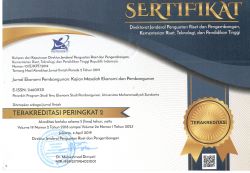PARADOKS ARROW, PERTUMBUHAN EKONOMI DAN RENCANA PEMBANGUNAN JANGKA MENENGAH NASIONAL (RPJMN) TAHUN 2004-2009
Sayuti Hasibuan(1*)(1) Program Pascasarjana Universitas Muhammadiyah Surakarta
(*) Corresponding Author
Abstract
Based on past experience as well as implementation paradigms embedded in the five-year plan 2004-2009, there is a very small likelihood that it can be successfully implemented. In the past before the crises of 1997, for a long time economic growth has been on average 6.8% per year. But that did not prevent open unemployment from rising. The plan target of reducing open unemployment to 5.1% in 2009 from about 9.7% in 2005 with 6.6% yearly average of economic growth appears very unrealistic. This unrealism is the more so because the plan as it stands embodies paradoxes in its various agendas and programs of action resulting from the operation of Arrow's impossibility theorem. While the plan aims at increasing productive employment, its assumption of human being as a resource is a passive, order receiving rather than an active, innovative and risk taking one.
More fundamentally, even if the plan target of economic growth is achieved, it, being on the physical plane, will fail, as it has in the past, to translate the spiritual and corporeal values of Belief in One God and Just and Enlightened Humanity contained in the 1945 constitution. Indonesian society will move further and further away from the cherished ideals of the founding fathers of the Republic with dire implications on its future prosperity and even of its existence. It has been proposed that the operational objective of maximizing economic growth be replaced by maximizing human capability which is more suited to accommodate the multiplicity of objectives in the 1945 constitution with the different levels of physical, corporeal and spiritual dimensions.Keywords
Full Text:
PDFReferences
Amartya Sen, 2000, Development as Freedom, New York: First Ducher Books Edition, him. 87-111 dan 297.
Arrow's Impossibility Theorem, from Wikipedia, the free encyclopedia, website
Harian Kompas, 2006, 28 Februari, Jakarta, hall
Harian Kompas, 2006, 4 Maret, Pengusaha Pesimistis, Jakarta, hal. 1.
Imam Gazali, 1998, The objective of the Shari'ah is to promote the welfare of human beings, which lies in safeguarding their faith, their life, their intellect, their posterity, and their wealth. Diterjemahkan oleh Muhammad Umar Chapra, dalam IRTI: Lessons In Islamic Economics, Jeddah, hal. 105.
John Geanakoplos, 2001, Three Brief Proofs of Arrow's Impossibility Theorem, Cowles Foundation For Research in Economics, Yale University, New Haven, Connecticut 06520-8281, June; http://cowles.econ.yale.edu/.
Majalah Tempo, 2005, Edisi 31 Januari-6 Februari, Jakarta, hal. 9.
Republik Indonesia, 1994, Rencana Pembangunan Lima Tahun Keenam, 1994/95-1998/99, Buku I, Jakarta, hal. 83.
Republik Indonesia, 1994, Rencana Pembangunan Lima Tahun Keenam, 1994/95-1998/99, Buku I, Jakarta, hal. 86-87.
Republik Indonesia, 1994, Rencana Pembangunan Lima Tahun Keenam, 1994/95-1998/99, Buku I, Jakarta, hal. 87
Republik Indonesia, 2004, Agenda 100 Hari Pertama Kabinet Indonesia Bersatu, Jakarta: Bappenas. hal. 1-2.
Republik Indonesia, 2004, Rencana Pembangunan Jangka Menengah Nasional 2004-2009 (RPJMN), Jakarta, hal. Bagian V.34-6.
Republik Indonesia, 2005, Rencana Pembangunan Jangka Menengah Nasional Tahun 2004-2009, Daftar Isi
Republik Indonesia, 2005, Rencana Pembangunan Jangka Menengah Nasional, hal. Bagian V.34-1
Republik Indonesia, 2005, Rencana Pembangunan Jangka Menengah Nasional, hal. Bagian V.34-5
Republik Indonesia, 2005, Rencana Pembangunan Jangka Menengah Nasional, hal. Bagian VI.35-1
Republik Indonesia, 2005, Rencana Pembangunan Jangka Menengah Nasional Tahun 2004-2009, Jakarta, hal. Bag.I.l-8, 1-9, 1-10, 1-11
Article Metrics
Abstract view(s): 837 time(s)PDF: 981 time(s)
Refbacks
- There are currently no refbacks.















